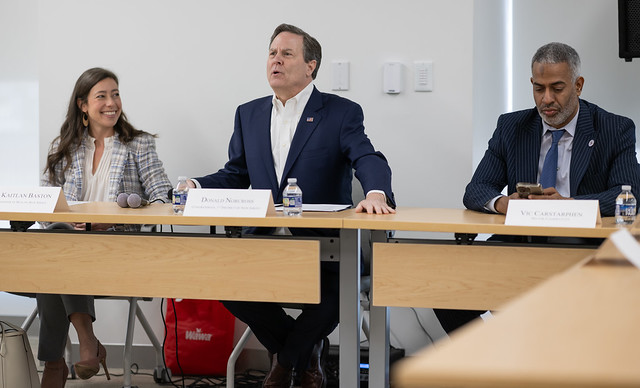 (Camden, NJ) – On Friday, the Board of Commissioners joined Congressman Donald Norcross New Jersey Health Commissioner Dr. Kaitlan Baston, local doctors, elected officials, and members of the community in Camden to discuss combatting the ongoing opioid epidemic and the Modernizing Opioid Treatment Access Act (MOTAA).
(Camden, NJ) – On Friday, the Board of Commissioners joined Congressman Donald Norcross New Jersey Health Commissioner Dr. Kaitlan Baston, local doctors, elected officials, and members of the community in Camden to discuss combatting the ongoing opioid epidemic and the Modernizing Opioid Treatment Access Act (MOTAA).
“This piece of legislation is removing barriers for people to access the treatment they need,” said Commissioner Director Louis Cappelli Jr., who also serves on the Camden County Addiction Awareness Task Force. “We know the impact that medically assisted treatment can make for individuals struggling with substance use disorder and by modernizing these programs, more people can easily access these lifesaving medications, which is crucial to combatting the devastation that the opioid epidemic has unleashed on our communities.”
Introduced by Congressman Norcross, Senator Ed Markey (D-MA) and Congressman Don Bacon (R-NE), MOTAA will increase access to care for people experiencing opioid use disorder by reforming the outdated regulations governing the prescription and dispensing of methadone. Currently, the prescribing and dispensing authority of methadone is strictly controlled by Opioid Treatment Programs, commonly referred to as methadone clinics.
“The crisis of the opioid epidemic continues to plague communities in South Jersey and across the country. That is why it was important today to bring all levels of government, local doctors, and members of our South Jersey community together today for a roundtable discussion on how we can improve access to care and save lives. Every life lost is not just a number or statistic, these are our neighbors, and we must do more to combat and end the opioid epidemic,” Norcross said. “My bipartisan, bicameral MOTAA will increase access and remove barriers to the proven-lifesaving medicine that people rely on to live healthy and safe lives free from addiction. People suffering from opioid addiction deserve better, and I am working ever day in Congress with my colleagues on both sides of the aisle to pass MOTAA into law and make a difference in the lives of those who need it most.”
The CDC estimates that 106,699 drug overdose deaths occurred in the United States in 2021. According to the New Jersey Office of the Chief State Medical Examiner, more than 2,500 people died of suspected drug deaths in 2023 with 326 in Camden County alone.
“I have seen firsthand the toll that the opioid epidemic has taken in our state on the individuals struggling with use and dependence and on their loved ones,” said New Jersey Health Commissioner Dr. Kaitlan Baston. “Finding innovative treatment solutions is about saving lives. It is also about bringing people who are struggling in the shadows into the light and treating them with dignity. I can see a New Jersey that is stronger, healthier, and that has all the necessary treatment solutions at the fingertips of every person who needs it.”
MOTAA makes two crucial changes to FDA regulations that have governed methadone since the 1970s and are not supported by modern medical science: allowing board-certified addiction physicians and addiction psychiatrists to prescribe methadone and allowing pharmacies to dispense methadone.
“Medically assisted treatment is a powerful and effective tool that is saving lives and helping countless people reach recovery from substance use,” said Gabriel Rodriguez, chief of the Camden County Police Department. “Allowing more access to these critically important medications, we are in turn making our communities safer and healthier, which is always the top priority for any law enforcement agency.”
MOTAA is endorsed by the Camden County Addiction Awareness Task Force, the New Jersey Hospital Association, American Society of Addiction Medicine (ASAM), American College of Academic Addiction Medicine (ACAAM), and the National Safety Council.
To view photos from the roundtable, click here.

